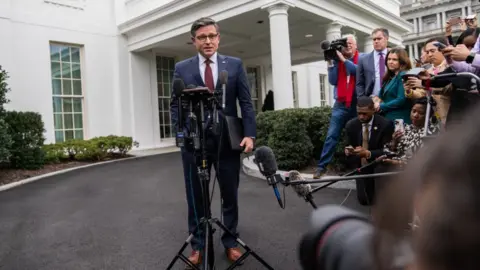Government shutdown: US lawmakers optimistic on spending deal
 Getty Images
Getty ImagesTop US lawmakers have vowed to avert a partial government shutdown ahead of a Friday deadline to approve funding.
"We will get the government funded," House Speaker Mike Johnson told reporters after a meeting with President Joe Biden on Tuesday.
Democrats and Republicans have been far apart in the budget negotiations on border security and aid to Ukraine.
Republicans control the House by a slim majority, while Democrats hold the Senate by a single seat.
There have been 10 US government shutdowns or partial shutdowns over the past four decades.
Spending bills to keep the US government open require buy-in from both parties in order to advance through both chambers to the president's desk.
If a deal is not reached, some government departments, including agencies that oversee agriculture, transportation and veterans affairs, will temporarily close by 12:01 on Saturday.
Other federal funding, including defence spending and homeland security and state department budgets, will expire a week later. Past shutdowns have led to furloughs of government workers and the closure of national parks.
President Biden met the top four lawmakers - Senate Majority Leader Chuck Schumer, Senate Minority Leader Mitch McConnell, House Speaker Mike Johnson and House Minority Leader Hakeem Jeffries - at the White House on Tuesday to discuss the effort to keep the government open.
"It's Congress' responsibility to fund the government," Mr Biden said at the start of the meeting. "A shutdown would damage the economy significantly, and I think we all agree to that, and we need a bipartisan solution."
Senator McConnell told reporters at the Capitol they had made "some real headway".
Senator Schumer said the meeting at the White House was "passionate". "It's in his hands," he said of Mr Johnson.
The Speaker is expected to put forward legislation in the coming days to keep the government open, though the details were uncertain.
Mr Johnson might offer to push back the deadline to 22 March, which would require another short-term continuing resolution (CR) to give legislators more time.
It was still being discussed as an option and was not finalised, the BBC's US partner CBS News reported.
The Speaker faces fierce objections from right-wing lawmakers in his ranks who want spending cuts and insist any further support for Ukraine should be tied to more money for US border security.
Those same members booted out the previous Speaker, Kevin McCarthy, in October, after they were angered by a short-term budget deal that Mr McCarthy made with Democrats.
A defence spending package including aid for Ukraine and Israel has passed the Senate, but Mr Johnson has so far resisted a vote on it in the House.
